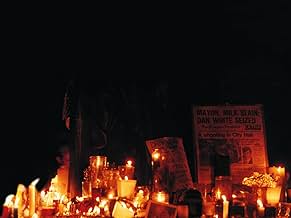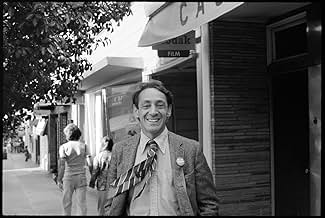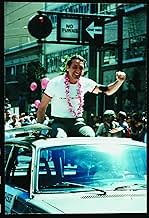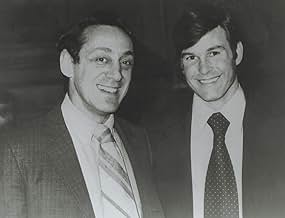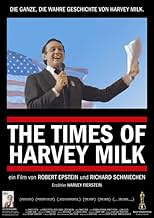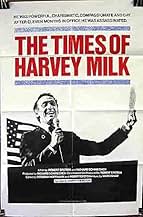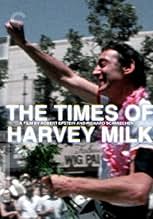NOTE IMDb
8,2/10
6,9 k
MA NOTE
Un documentaire sur la carrière et l'assassinat du premier conseiller municipal gay élu à San Francisco par un autre conseiller municipal : Dan White.Un documentaire sur la carrière et l'assassinat du premier conseiller municipal gay élu à San Francisco par un autre conseiller municipal : Dan White.Un documentaire sur la carrière et l'assassinat du premier conseiller municipal gay élu à San Francisco par un autre conseiller municipal : Dan White.
- Réalisation
- Scénario
- Casting principal
- Récompensé par 1 Oscar
- 11 victoires et 2 nominations au total
Harvey Fierstein
- Narrator
- (voix)
Harvey Milk
- Self
- (images d'archives)
John Briggs
- Self
- (images d'archives)
Jerry Brown
- Self
- (images d'archives)
Jimmy Carter
- Self
- (images d'archives)
Dianne Feinstein
- Self
- (images d'archives)
- (as Mayor Dianne Feinstein)
David Fowler
- Self - TV Interviewer of Dan White
- (images d'archives)
Joseph Freitas
- Self
- (images d'archives)
Terence Hallinan
- Self
- (images d'archives)
George Moscone
- Self
- (images d'archives)
Avis à la une
This documentary richly deserved the Oscar awarded to it. One would have to be made of stone not to cry at least once. Poignant & powerful, it weaves through the story of this remarkable man with grace and dignity. Even if you are blase about the issue of gay rights, see this movie. I first saw it by renting the video, then purchased it. The events took place when I was a freshman in high school & can recall reading about the tragedy in civics class.
10PDWadler
This is a very important film, documenting the coming-of-age of LGBT involvement in the political process. Made just a few years after the Milk/ Moscone assassinations, it expertly captures the mood of a community, pre-AIDS, poised to assume political power.
The climax of the film is the peaceful, strangely silent, candle-lit march up Market Street from the Castro, the center of San Francisco's gay male community. The gay community's response to horrific violence is shock and love. When I show this film to young (mostly heterosexual) student audiences, there is always a collective gasp as they see the throngs of silent marchers.
The climax of the film is the peaceful, strangely silent, candle-lit march up Market Street from the Castro, the center of San Francisco's gay male community. The gay community's response to horrific violence is shock and love. When I show this film to young (mostly heterosexual) student audiences, there is always a collective gasp as they see the throngs of silent marchers.
Epstein (and Friedman) make documentaries by assembling talking heads, news footage, and narration -- they make documentaries about events and phenomena, not about detailing lives as they happen. This is an event timepiece, and it hits a weak spot in me -- it's a good movie regardless, but it twists something that makes my heart ache. The movie itself might not warrant such a high rating, but what it depicts does evoke very strong emotions, specifically in the last half hour: you come out of the movie shattered and raging. It's a very lean hour and-a-half, and it manages to cram in as much of a sense of the time, at least in terms of the gay perspective, as possible. Epstein's movie is about the gay experience, but he's not a propagandist: he's more than willing to show that the Democratic Jimmy Carter didn't want to be photographed with Milk, that his sister offered to "cure" Milk of his homosexuality through religion; and he's open to showing that Ronald Reagan, much despised in the gay community, did not support California's Proposition 6, which would make it legal to fire existing teachers who were openly gay.
The film's aim is to make a martyr out of Milk -- but then, he is one, isn't he? He knew his own assassination was coming, or felt that it could; it's why he taped his own will assuming it might be heard if in fact he was assassinated (though he likely wouldn't have known it would be an angry former fellow city supervisor who would kill him). When the head of the city supervisors announces that the mayor and Milk have been killed, presumably by Dan White, distraught about not being re-selected as a city supervisor after resigning the position and then wanting it back, it's like an electric shock to the back of your neck, the crowd of news reporters shrieking in disbelief. The story is famous: White, who shoots Milk five times (once in the head), is found guilty only of voluntary manslaughter (and eventually released after just five and-a-half years), and his trial findings result in a street mob. That mob mentality grosses me out, but when citizens furious with the ruling start to firebomb police cars in the street, I couldn't help but feel for them and root them on; this kind of spit in the face to the gay community (and the memory of two dead, innocent men) deserves a gut reaction. There's a difference between mobs fueled by hate and mobs fueled by injustice. When someone says, "We are reacting with anger because we are ANGRY" you feel that anger. When we see thousands of people in the darkened street holdings candles over their heads, you might begin to weep. 9/10
The film's aim is to make a martyr out of Milk -- but then, he is one, isn't he? He knew his own assassination was coming, or felt that it could; it's why he taped his own will assuming it might be heard if in fact he was assassinated (though he likely wouldn't have known it would be an angry former fellow city supervisor who would kill him). When the head of the city supervisors announces that the mayor and Milk have been killed, presumably by Dan White, distraught about not being re-selected as a city supervisor after resigning the position and then wanting it back, it's like an electric shock to the back of your neck, the crowd of news reporters shrieking in disbelief. The story is famous: White, who shoots Milk five times (once in the head), is found guilty only of voluntary manslaughter (and eventually released after just five and-a-half years), and his trial findings result in a street mob. That mob mentality grosses me out, but when citizens furious with the ruling start to firebomb police cars in the street, I couldn't help but feel for them and root them on; this kind of spit in the face to the gay community (and the memory of two dead, innocent men) deserves a gut reaction. There's a difference between mobs fueled by hate and mobs fueled by injustice. When someone says, "We are reacting with anger because we are ANGRY" you feel that anger. When we see thousands of people in the darkened street holdings candles over their heads, you might begin to weep. 9/10
10Ozdachs
I felt it was a powerful film as I saw it as a new arrival in SF in 1984. I didn't understand its power, though, until the documentary ended and the theather kept the lights very low. As I got up and started walking to the exit, I realized that most of the audience kept their seats. Very odd, since the credits and EVERYTHING had ended. The folks were just sitting and crying.
Art has historically been used to let people rethink and understand the events of their times. (Think Shakespeare.) This film is that type of "art".
Art has historically been used to let people rethink and understand the events of their times. (Think Shakespeare.) This film is that type of "art".
The life and aftermath in death of wonderfully wry and droll Harvey Milk, San Francisco's first openly gay city official who, along with Mayor George Moscone, was killed on a November day in 1978 by disgruntled ex-colleague Dan White (who ultimately received an unusually light sentence after his trial). From Milk's sneaky campaigning tricks to the infamous 'Twinkie Defense', this documentary is solid and involving. It has a creepy ambiance that is difficult to shake after it's over, yet there's a darkly amusing undercurrent throughout (which Milk himself might've appreciated!). The film says to take these events seriously, but to take them AS events. See the humor in the chaos. This was a deserved Oscar winner for Best Documentary Feature; it is quite moving, funny, despairing--never clinical or cold. *** from ****
Le saviez-vous
- AnecdotesSelected for preservation by the National Film Registry in 2012.
- GaffesWhen describing Harvey Milk's murder, the narrator states that Dan White killed Milk in Milk's own office. In reality, White asked Milk to come into White's former office, closed the door, blocked it with his body, and shot Milk.
- Citations
[last lines]
Harvey Milk: I know that you cannot live on hope alone, but without it, life is not worth living. And You... And You... And You... Gotta give em hope. Thank You very much.
- Bandes originalesYou Make Me Feel (Mighty Real)
Performed by Sylvester
Written by Sylvester & James Wirrick (as Tip Wirrick)
Tim McKenna (Borozi Music Artists)
Fantasy Records
(c) 1978 Rights Donated
Meilleurs choix
Connectez-vous pour évaluer et suivre la liste de favoris afin de recevoir des recommandations personnalisées
- How long is The Times of Harvey Milk?Alimenté par Alexa
Détails
- Date de sortie
- Pays d’origine
- Site officiel
- Langue
- Aussi connu sous le nom de
- Wer war Harvey Milk?
- Lieux de tournage
- Sociétés de production
- Voir plus de crédits d'entreprise sur IMDbPro
Box-office
- Montant brut aux États-Unis et au Canada
- 13 801 $US
- Week-end de sortie aux États-Unis et au Canada
- 2 213 $US
- 17 sept. 2000
- Montant brut mondial
- 46 573 $US
Contribuer à cette page
Suggérer une modification ou ajouter du contenu manquant


